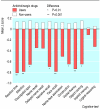Non-degenerative mild cognitive impairment in elderly people and use of anticholinergic drugs: longitudinal cohort study
- PMID: 16452102
- PMCID: PMC1382539
- DOI: 10.1136/bmj.38740.439664.DE
Non-degenerative mild cognitive impairment in elderly people and use of anticholinergic drugs: longitudinal cohort study
Abstract
Objective: To assess the potential of anticholinergic drugs as a cause of non-degenerative mild cognitive impairment in elderly people.
Design: Longitudinal cohort study.
Setting: 63 randomly selected general practices in the Montpellier region of southern France.
Participants: 372 people aged > 60 years without dementia at recruitment.
Main outcome measures: Anticholinergic burden from drug use, cognitive examination, and neurological assessment.
Results: 9.2% of subjects continuously used anticholinergic drugs during the year before cognitive assessment. Compared with non-users, they had poorer performance on reaction time, attention, delayed non-verbal memory, narrative recall, visuospatial construction, and language tasks but not on tasks of reasoning, immediate and delayed recall of wordlists, and implicit memory. Eighty per cent of the continuous users were classified as having mild cognitive impairment compared with 35% of non-users, and anticholinergic drug use was a strong predictor of mild cognitive impairment (odds ratio 5.12, P = 0.001). No difference was found between users and non-users in risk of developing dementia at follow-up after eight years.
Conclusions: Elderly people taking anticholinergic drugs had significant deficits in cognitive functioning and were highly likely to be classified as mildly cognitively impaired, although not at increased risk for dementia. Doctors should assess current use of anticholinergic drugs in elderly people with mild cognitive impairment before considering administration of acetylcholinesterase inhibitors.
Figures
References
-
- Petersen RC, Smith GE, Waring SC, Ivnik RJ, Tangalos EG, Kokmen E. Mild cognitive impairment: clinical characterization and outcome. Arch Neurol (1999);56: 303-8. - PubMed
-
- Winblad B, Palmer K, Kivipelto M, Jelic V, Fratiglioni L, Wahlund LO, et al. Mild cognitive impairment—beyond controversies, towards a consensus: report of the International Working Group on Mild Cognitive Impairment. J Intern Med (2004);256: 240-6. - PubMed
-
- Tierney MC, Szalai JP, Snow WG, Fisher RH, Nores A, Nadon G, et al. Prediction of probable Alzheimer's disease in memory-impaired patients: a prospective longitudinal study. Neurology (1996);46: 661-5. - PubMed
-
- Ritchie K, Artero S, Touchon J. Classification criteria for mild cognitive impairment: a population-based validation study. Neurology (2001);56: 37-42. - PubMed
Publication types
MeSH terms
Substances
LinkOut - more resources
Full Text Sources
Other Literature Sources

